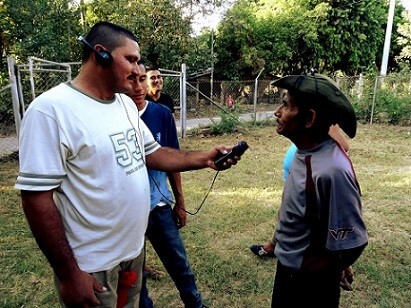These mountains are not for sale. Photo by Caravana Mesoamericana.
This month, the Mesoamerican Caravan launched a community fundraiser to support the publication of “Mesoamerica Rising: A book from Peoples in Resistance, for Peoples in Resistance,” which aims to compile the stories, lessons, and autonomous alternatives shared by land and water protectors from Mexico to Costa Rica. Members of the project hope that the book, which grew out of the caravan’s collaboration with indigenous and campesino communities that oppose megaprojects like mines, pipelines, and dams, will serve as a practical tool “from and for peoples everywhere that are working to knock down the extractive industry and create something more just in its place.”
In 2015-16, the caravan traveled to 17 communities in Mexico, Guatemala, El Salvador, Honduras, Nicaragua, and Costa Rica, documenting resistance movements and sharing workshops on community media and alternative technology. Participants in the project produced a series of documentaries and radio programs about land defense movements; streamed live radio shows using the caravan’s mobile transmitter; worked with elders to create a registry of medicinal plants; prepared organic repellents and fertilizers for crops; built pedal-powered machines and composting toilets; and made participatory maps to visualize the impacts of resource extraction from the bottom up.

The recently announced book will include the stories of four Mexican communities that participated in the caravan: Amilcingo, located in the Popocatépetl volcano region in the South Central state of Morelos, is home to a vibrant, autonomous radio station that has been a critical tool of the community’s resistance to a gas pipeline. Residents of Paso de la Reina, on the Costa Chica of Oaxaca, successfully stopped a hydroelectric dam by maintaining a 24-hour blockade and organizing with affected communities across the region. In San Mateo del Mar in Oaxaca’s Isthmus of Tehuantepec, resistance to wind turbine parks has brought to light the dirty side of clean energy, and continues to remain grounded in indigenous culture and ceremony. Lastly, in Cruztón, where former plantation workers occupied land stolen from their ancestors, residents are organizing to defend their territory from the looming threat of metallic mining.

Members of the Mesoamerican Caravan say the book will feature insight into the strategies corporations use to impose projects, as well as the strategies communities use to defend their land. The publication, which is expected to be released in the fall of 2017, will also include manuals of the tools built during the caravan, as well DVDs with audiovisual material.
Learn more about the project and support the fundraiser here!
About the Authors
Collectives in Action is a network of 12 collectives from Mexico, Europe, the United States, and other parts of the world. We bring together many years of experience in the use of community media and appropriate technology in defense of autonomous territories. We work horizontally in order to mutually strengthen peoples who defend their land from the imposition of mega-development projects.



